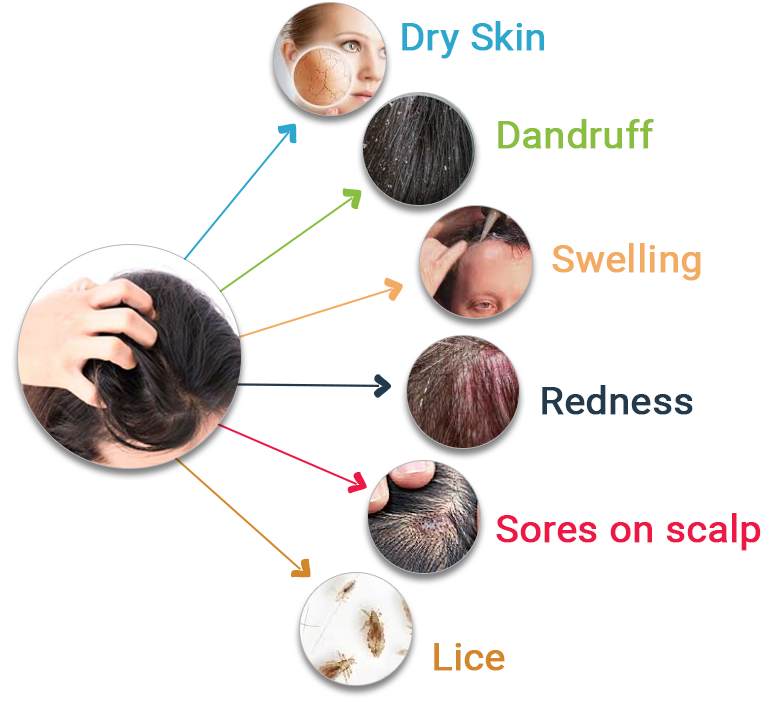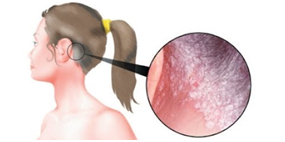Itchy Scalp? Don’t Scratch!!! Use these insightful remedies to treat itchy scalp
What are the symptoms of an Itchy scalp?
Itchy scalp can make you feel stinging and painful. Scratching can give you itchy scalp relief but it can be painful if you will do it vigorously. Symptoms which you can face during itchy scalp are;
What causes itchy scalp actually?
Itching in scalp is also known as scalp pruritus. There are many causes of itchy scalp. These scalp problems can vary from dandruff to seborrheic dermatitis to serious autoimmune disorders. If you are thinking of reasons for itchy scalp, have a look at the below section;
Dandruff is the common disorder of scalp which can affect anyone. When it comes to dandruff, mostly people think of flakes or scaly scalp. These white flakes mount up in hair, shoulders and get worse when the air is dry.
Microbes behind dandruff:
Do you know that dandruff is caused by microbe Malassezia spp. Scalp have oil glands, oil sebum is produced by the hair follicles, microbial action takes place. Microbe Malassezia spp. acts on the scalp and bind to the sebum. As a result of which scalp become dry or irritated. While scratching the scalp, skin loses many cells and scalp looks flaky or scaly, ultimately shedding of these flakes occurs.
Seborrheic Dermatitis
Seborrhoeic dermatitis is a chronic inflammatory skin condition. You will notice yellow colored scaly skin in area rich in sebaceous glands. Along with itching you can face severe inflammation also. Lack of nutrients, emotional stress, alterations in immune system can also be the reason of seborrhoeic dermatitis.
Dandruff is a form of seborrhoeic dermatitis without inflammation. When Malassezia hydrolyze the human sebum, it releases the saturated and unsaturated fatty acids which penetrate the scalp but breach the skin’s barrier forming yellow layer. This results in irritation and inflammation leading to seborrhoeic dermatitis.
Treatment to get rid of Seborrhoeic dermatitis
Zinc Pyrithione or ZPTO also inhibits the yeast Malassezia which causes seborrheic dermatitis. It regulates the yeast and secreted oils from scalp. You can use shampoo or lotion containing ZPTO.
Head Lice
Head lice are common. They can affect anyone. Head lice are small, grey brown insects living on scalp. Eggs of lice are known as Nits. No matter, if your hair are clean, long or short, you can have head lice. You can call them little vampires too, as they feed on little amount of blood of scalp. When lice bite, this makes your scalp itchy.
Natural remedy for itchy scalp due to Head Lice
Nit Comb: This is the first thing to do when you came to know that you have head lice. Use nit comb to remove all the lice from the scalp.
Neem Oil: Neem oil is effective against almost every type of parasite. Its pungent smell helps to kill the head lice and will make your scalp free from itching.
Vinegar & Salt: This is considered as the lethal combination for killing head lice. Vinegar contains acetic acid and salt exhibits desiccating properties. It is considered as the effective treatment for itchy scalp due to head lice.
Itchy Scalp and Hair Loss
Itchy scalp causes hair loss. Sometimes we do scratch our scalp so vigorously that it lead to falling out some hair follicles. There are various scalp disorders due to which you can face hair fall. Skin disorders like Psoriasis, Contact Dermatitis, Folliculitis and Hypothyroidism can contribute in making scalp itchy and hair loss.
Psoriasis
Psoriasis is referred to as chronic inflammatory skin disease. It can turn your scalp into reddish or often in scaly patches. It can occur as a single patch on even on entire scalp. Along with scalp, it can appear on your forehead, back of neck and behind ears. Psoriasis can also cause itchy bumps on scalp which may occur due to inflammation. Itchy scalp treatment for psoriasis may include topical treatments, medications or natural remedies too.
Topical Treatments
There are various medicated shampoos, ointments, soaps which can be used to treat itchy scalp. FDA (Food and Drug Administration) have approved over the counter drugs which can treat psoriasis are;
- Salicylic Acid
- Coal Tar
FDA has also approved latest medications known as biologics. These biologics can be given by injection or IV which keeps your skin from making too many cells.
Folliculitis
Scalp folliculitis can also cause hair loss, itching or soreness. Folliculitis look like acne small spots or small rings of inflammation around the opening of a hair follicle following itching & soreness. Rigorous folliculitis causes excess inflammation which can permanently destroy hair follicles and bald spot. Non-infectious folliculitis is caused by excess oil and sebum on the scalp that can also clog the hair follicles.
Treatment
Folliculitis can be treated using antifungal shampoo or antifungal topical cream. Over the counter skin fading creams are also available which are known to be effective.






Comments are closed.